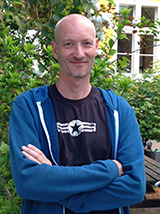Research into values contributes to a more nuanced debate on integration
Professor Nils Holtug examines the relation between people's values and social cohesion. His research and dissemination play an important role as the background to integration policy initiatives in Denmark. During the current refugee crisis, Nils Holtug's opinion articles, feature articles, interviews, etc., in the national media are contributing to raising the general level of public awareness.

Nils Holtug
Throughout history, migration and mobility have been vital to society's development. In our times too, population migration is affecting labour market conditions, political culture and national identity in a very concrete manner, not least the question of which values ensure social cohesion in society. These issues are widely discussed in the current political situation, i.e. with a refugee crisis and migration from the Middle East and North Africa to Europe.
Social cohesion is a key theme in Professor Nils Holtug's research. He is Director of the Centre for Advanced Migration Studies (AMIS) and is himself a contributor to migration research with his analyses of the significance of values to the cohesion of Danish society.
Politicians often advocate a specific immigration policy or integration policy, referring to how Danish values are threatened by immigration, thereby putting social cohesion under pressure. Yet there are different views of what Danish values actually are, and which values form the basis for this cohesion.
In conjunction with a major research project, for which Nils Holtug has received a Sapere Aude Top Researcher grant from the Danish Free Research Council, he is examining the various arguments in this debate, including which ideals for the political and social community they are based on. To varying degrees, these arguments are founded on, for example, nationalistic, republican, liberal or multi-cultural premises, and he examines how these premises harmonise with core values of liberal democracy. He also empirically examines various ideas or hypotheses concerning which sets of values create a society with strong cohesion, defined as a society with a high degree of trust and solidarity.
According to conservative nationalism, a society will have greater social cohesion if its citizens share a national identity and culture, as well as national traditions. Liberals claim that fundamental liberal-democratic principles of freedom, equality and tolerance promote trust and solidarity, and thereby social cohesion. And according to multiculturalism, mutual trust and solidarity between citizens is created through recognition of the cultural differences in the population.
Together with his colleagues, Nils Holtug investigates these hypotheses concerning the relation between values and social cohesion. Is it the case, for example, that Danes who identify with other Danes on the basis of a shared Danish national culture also have greater confidence in and solidarity with their fellow citizens?
The empirical study is based on a questionnaire survey conducted in collaboration with Statistics Denmark in 2014. This study also gives Nils Holtug and his colleagues the opportunity to compare ethnic Danes' and non-western immigrants and their descendants' attitudes towards central values in the liberal democracy.
The latter research shows overwhelming support among both ethnic Danes and non-Western immigrants and their descendants for central values in the liberal democracy, such as 'democratic participation', 'equal opportunities for everyone irrespective of gender, ethnicity or social background' and 'a duty to society to work if you are able to'.
Yet the analysis does reveal differences between the two groups in terms of support for elements of freedom of expression and freedom of religion. Far more ethnic Danes believe that freedom of expression includes 'being able to criticise any religion'. On the other hand, far more immigrants and their descendants believe that 'Muslim women should be allowed to wear headscarves, e.g. if they work in a supermarket'.
Impact
This knowledge plays an important role as the background to integration-policy initiatives in Denmark. Nils Holtug's research results were published in the media up to the parliamentary elections in June 2015, and during the current refugee crisis, a number of feature articles, opinion articles and interviews in national newspapers, blogs, radio programmes, etc., are contributing to raising the general level of knowledge in the population and among politicians.
With a grant from the Danish Strategic Research Council awarded in 2009, Nils Holtug has also been co-principle investigator and undertaken research in a project entitled 'Social Cohesion and Ethnic Diversity' in cooperation with the City of Copenhagen and the former Danish Ministry of Integration. This project has strengthened the knowledge base for the City's integration initiatives. At seminars, etc. Nils Holtug has presented the analysis results to civil servants, as the background to the City's concrete integration activities.
On several occasions, Nils Holtug has also been invited to give presentations to various government ministries on such topics as social cohesion and the refugee crisis, and he has been a member of a number of expert panels, e.g. for the Danish Council of Ethics and the Danish Board of Technology.
Read more
Analysis in Politiken, 12 June 2015: Integration. Nydanskere deler danske værdier. (New Danes share Danish values) https://vbn.aau.dk/files/214457062/Pol_analyse.pdf
Article in Politiken, 17 August 2015: Vi glemmer vores principper, når vi diskuterer flygtningepolitik. (We forget our principles when we discuss refugee policy.)
https://politiken.dk/debat/ECE2797439/vi-glemmer-vores-principper-naar-vi-diskuterer-flygtningepolitik/
Radio interview with Nils Holtug in DR P1 programme Apropos – Befolkning (Population), 12 November 2015:
https://www.dr.dk/p1/apropos/apropos-2015-11-12/
Research article in Ethnicities, December 2010: Immigration and the politics of social cohesion.
Kontakt
Nils Holtug
Professor, dr.phil., Centre for Advanced Migration Studies (AMIS),
Department of Media, Cognition and Communication
E-mail: nhol@hum.ku.dk
Tel.: (+45) 35 32 88 81
